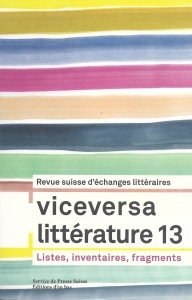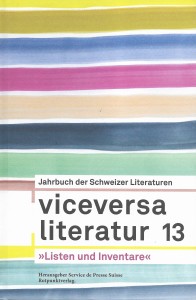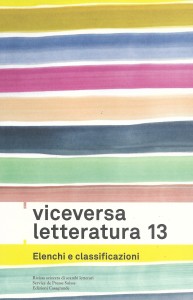John Taylor / José-Flore Tappy / Viceversa
- Post By: johntaylor
- Date:
- Category: Actualités
Un choix de poèmes traduits de Trás-os-Montes (Éditions La Dogana) de José-Flore Tappy et un texte de John Taylor sur son travail avec la poétesse dans le numéro 13 de Viceversa. Voici le texte original qui a été traduit en française, en allemand et en italien pour le numéro:
Translating José-Flore Tappy
I first came across José-Flore Tappy’s poetry at the Looren Translation House in November 2010. I translated one poem there, then the sequence of poems in which that poem was included, then—as the months went by—the book in which that sequence was included, and, as the years went by, all of her published books from Errer mortelle (1983) to Tombeau (2013). I launched myself into that project without initially having a publisher because I realized from that very first poem—“Entre hier et demain,” which opens the sequence Poèmes de l’ombre, a sequence that is comprised in Terre battue (1995)—that her poetry had important things to say to me, to all of us. When the poet Paul B. Roth of the Bitter Oleander Press read the entire translation manuscript, he opened up room, in a forthcoming issue of the Bitter Oleander magazine, for a long interview with José-Flore and many of her poems. Then he published the manuscript bilingually in 2014 as Sheds: Collected Poems 1983-2013.
Three years later, the same spontaneous urge to translate José-Flore’s poetry was sparked when she sent me the manuscript of her new book, Trás-os-montes. That e-mail, with its Word document, arrived on 11 December 2017. The book was going to appear several months later at the Éditions La Dogana. Our e-mail correspondence makes me smile. I had read the manuscript by December 25. On that same Christmas day, I conveyed my impressions of the book to José-Flore and concluded:
« Vraiment, je l’aime beaucoup. Si tu es d’accord, j’aimerais le traduire. Je ne sais pas exactement quand (et peut-être vas-tu apporter quelques changements au manuscrit, comme tu me l’as dit), et j’ai déjà d’autres projets sur la planche, comme tu sais, mais peut-être tout de même assez vite, au moins pour amorcer le travail. Qu’en penses-tu? »
I’m chuckling now as I reread her reply, written the next day:
« Comment refuser une nouvelle traduction de ta part…?? Je trouve seulement bizarre de t’imaginer traduire un livre qui n’existe pas encore… Pour moi, un texte, tant qu’il n’est pas publié, n’existe pas. Surtout il reste ouvert, toujours susceptible de se transformer. C’est comme si tu fêtais — ou épousais le reflet de quelqu’un. Je préférerais te dire d’attendre le printemps, où tu tiendras un vrai livre dans les mains. J’y croirai alors moi-même tout à fait et pourrai m’en détacher, séparation indispensable pour pouvoir en parler. »
So I obediently and somewhat impatiently waited, making progress on those “other projects.” José-Flore sent me the published book on 13 May 2018. I indeed noticed a few minor changes with respect to the Word document. By May 23, I am writing her a message:
« Nous sommes à Aix-les-Bains depuis hier soir [. . .] et — figure-toi — j’ai commencé à traduire les premiers poèmes de ton livre. Je n’ai rien à te montrer pour l’instant, car justement ce n’est pas facile de jongler en anglais avec tes subtilités françaises. (Questions de syntaxe souvent qui relèvent surtout de notre manque de désinences en anglais et la nécessité de bloquer certaines significations possibles . . . Bref, la traduction. . .) Mais j’y arriverai bien! Ma ‘difficulté préférée’ pour l’instant, c’est l’extraordinaire enjambement ‘regard / triste’ et ce ‘depuis’ :
elle fixe de son regard
triste le vide
depuis quels temps lointains
quelle région reculée de la mémoire”
This is how the joyful labor on Trás-os-montes began. As my translation progressed, I sent sections of it by e-mail to José-Flore, with questions and comments in the margins; and she would respond and send the draft back to me. I would make any necessary modifications and sometimes ask her another question about a tricky word or line, because making even a slight change in a translation-in-progress occasionally conjures up unsuspected questions which, moreover, might well have to do with words or lines elsewhere in the manuscript. Slowly but surely the definitive version took shape. Examining the inbox and outbox of my e-mail, I see that we exchanged no less than seven messages on 3 September, four of which dealt with her expression “l’heure blanche”:
J. T.: Je réfléchis de nouveau à la traduction de “l’heure blanche”, à la fois comme titre (de section) et comme expression dans l’un de tes poèmes. C’est délicat. Comme tu sais, j’ai “the blank hour” pour l’instant (et je me souviens de ma logique à l’époque), tandis que la traduction classique de l’expression française “nuit blanche” est “sleepless night”.
J.-F. T.: C’est une expression que je me suis inventée pour moi-même. Il y a une analogie avec “nuit blanche” sans doute, mais qui m’aura partiellement échappé. J’entends par l’heure blanche une heure sans couleur, sans définition, entre jour et nuit, avant que tout bascule dans l’obscurité — ou juste avant que le jour se lève. Une heure intermédiaire.
JT.: Merci ! J’ai retrouvé toute ma logique et je l’ai reconsidérée de nouveau. Je reste avec « blank hour », d’autant plus que ton poème me guide (de nouveau!) dans cette direction et reconfirme mon choix. “Blank” (même étymologie que “blanc”, bien sûr) a ces connotations de vide, d’absence de couleur, de quelque chose qui doit être rempli (mais qui ne l’est pas encore), etc. ; “white” n’est que la couleur, au fond. Avec un peu de chance, je t’envoie la préface sous peu. On avance bien, n’est-ce pas?!
J.-F. T.: Comme toi, j’aime beaucoup “blank”, intuitivement… Ce n’est pas une couleur, mais un vide, un état d’âme, un suspens. Oui, c’est fort!
And just a couple of days ago—I’m writing this on October 23—I suppressed a comma in one poem and shifted a word to the next line in another. . . .
Among translators, opinions vary about the interest and necessity of communicating with authors. Personally, I have always sought out this close dialogue with the poets whom I translate. Their viewpoints about keywords, implicit meanings, cultural allusions, syntactic subtleties, punctuation, sound (José-Flore is especially attentive to this), and their overall poetics are invaluable. I listen closely to what they have to say, even if all the ultimate decisions are mine. José-Flore and I engaged in an extensive dialogue about my translation of all her previous poetry, as gathered in Sheds; and we carried on the same type of dialogue throughout my work on Trás-os-montes. And now that the job of translating Trás-os-montes is finished, it’s time to start looking for a publisher.
I would like to cite another reason why José-Flore’s poetry is important to me, in fact has become a part of me. Two or three years after Sheds was published, I realized that my work on her poems had affected the writing of my own poetry. It’s a matter of grammar and syntax—an essential issue since it involves the structural “translation,” into words, of our ways of thinking about and perceiving the world (both “inner” and “outer”). José-Flore’s poetry is characteristically short, concise, and sometimes fragmentary. She often eliminates grammatical connectors and facile transitions between phrasal elements or lines of verse. As I was reading the proofs of my collection The Dark Brightness (Xenos Books, 2017), I noticed that my recent poems similarly tended to be structured around an absence of connectors. I had of course already known this, for I had worked long on the poems and made many revisions, but at the same time I had not sensed all the factors fueling this stylistic evolution. And this was also true of poems written at the same time and included in two books published just afterwards, Grassy Stairways (The MadHat Press, 2017) and Remembrance of Water & Twenty-Five Trees (Bitter Oleander Press, 2018). In other words, the technical—grammatical, syntactic—chore of finding English equivalents for José-Flore’s particular writing style had, without my being initially aware of the phenomenon as it was taking place within me, liberated me from similar grammatical and syntactic strictures in English. And I am grateful to her poetry for that.
© John Taylor



Laisser un commentaire